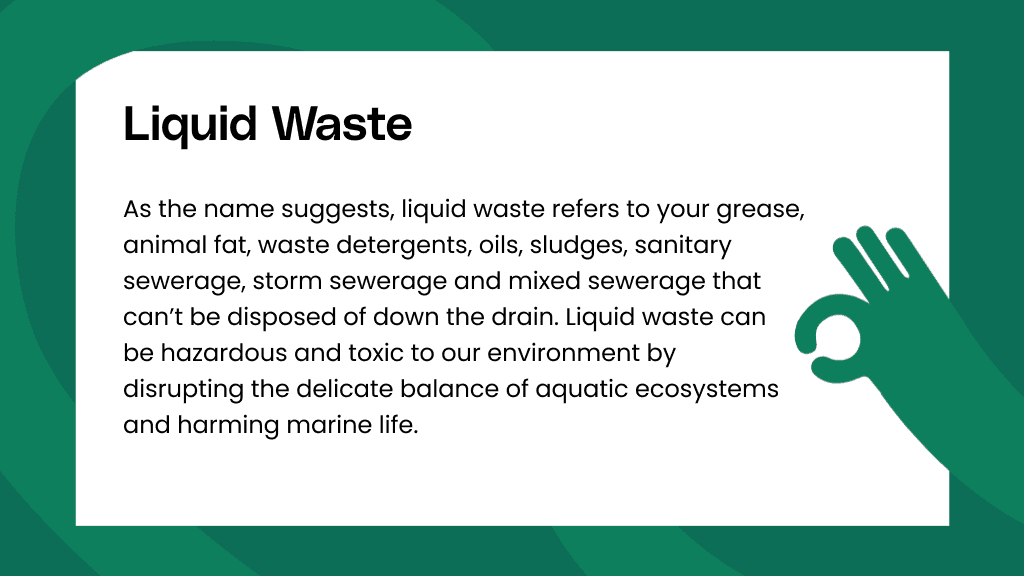Some Known Questions About Reclaim Waste.
Some Known Questions About Reclaim Waste.
Blog Article
What Does Reclaim Waste Mean?
Table of ContentsGetting My Reclaim Waste To WorkReclaim Waste Things To Know Before You BuyLittle Known Facts About Reclaim Waste.The 4-Minute Rule for Reclaim WasteThe Main Principles Of Reclaim Waste
Explore the types, incidents, and forms of fluid waste. Domestic sewer waste refers to the waste and products from a household septic system. This type of waste is developed by people in houses, colleges, and other structures. This only consists of septic systems that have a drainpipe area. The appropriate management and disposal of residential sewage waste require fluid waste to be transferred to a sewer treatment plant where the correct methods and tools are applied to detoxify and dispose of waste.
Industrial waste frequently consists of potential threats, such as combustible materials or a blend of fluid and solid waste products, and needs an advanced and in-depth disposal procedure. The disposal of commercial waste usually entails the filtration of waste before transport to make certain safe and correct disposal. Industrial waste is produced from byproducts and overflow of commercial procedures and production.
This kind of waste can not use the exact same sewage monitoring transport or procedures as septic or business fluids. The commercial waste management process needs the assessment and screening of liquid waste prior to it goes through the disposal procedure (liquid waste disposal melbourne). Drainage waste is the liquid waste that comes from overflow and excess stormwater in highly populated areas or cities
Runoff waste can cause contamination and flooding if not dealt with properly. Learn more about sewer cleaning and waste monitoring. Guaranteeing proper waste administration can stop catastrophes and lower ecological injury. Both individuals in domestic settings and professionals in commercial or manufacturing sectors can take advantage of recognizing the procedures and regulations of fluid waste monitoring.
Some Ideas on Reclaim Waste You Should Know
Contact PROS Solutions today to learn regarding our waste management and disposal solutions and the proper methods to look after the fluid waste you create.
(https://reclaimwaste.godaddysites.com/f/efficient-liquid-waste-disposal-removal-melbourne)This so-called 'wastewater' is not just an essential resource yet, after treatment, will certainly be released to our land, rivers or the ocean. Made use of water from bathrooms, showers, baths, cooking area sinks, washings and industrial procedures is understood as wastewater.

water used to cool down machinery or clean plant and tools). Stormwater, a type of wastewater, is drainage that flows from farming and urban areas such as roofs, parks, yards, roadways, paths and gutters into stormwater drains pipes, after rain. Stormwater streams untreated directly to neighborhood creeks or rivers, eventually getting to the sea.
The Ultimate Guide To Reclaim Waste
In Queensland, many wastewater is treated at sewage treatment plants. Wastewater is moved from residential or commercial websites via a system of sewage systems and pump terminals, recognized as sewage reticulation, to a sewage treatment plant.
The Department of Natural Resources suggests local governments concerning managing, operating and preserving sewage systems and therapy plants. In unsewered locations, city governments might call for householders to install private or home sewer therapy systems to treat residential wastewater from bathrooms, kitchen areas, shower rooms and laundries. The Division of Natural Resources authorizes the use of household systems when they are confirmed to be efficient.
The majority of stormwater receives no therapy. In some new subdivisions, therapy of some stormwater to remove clutter, sand and crushed rock has started utilizing gross pollutant catches. Wastewater treatment takes place in four phases: Eliminates strong issue. Larger solids, such as plastics and various other objects mistakenly released to sewage systems, are gotten rid of when wastewater is gone through displays.
Makes use of tiny living organisms recognizes as micro-organisms to damage down and eliminate continuing to be dissolved wastes and fine bits. Micro-organisms and wastes are incorporated in the sludge.
The 45-Second Trick For Reclaim Waste
Nutrient removal is not available in all sewer therapy plants due to the fact that it calls for pricey specialized tools. It is coming to be more common in Queensland. Clear fluid effluent generated after therapy might still have disease-causing micro-organisms. If this effluent is launched right into rivers such as rivers or the sea, the micro-organisms will ultimately die out.

The majority of wastewater flows right into the sewerage system. Under the Act, local governments carry out authorizations and licences for ecologically relevant tasks (ERAs) entailing wastewater releases that could have a local influence.
Indicators on Reclaim Waste You Should Know
Otherwise, samples are considered laboratory evaluation. Frequently lots of examinations are required to establish the levels of each of the various contaminants such as oils, heavy steels and chemicals in water. Tracking offers valid details regarding water high quality and can confirm that licence conditions are being satisfied. The details gotten through monitoring provides the basis for making water quality decisions.
Report this page